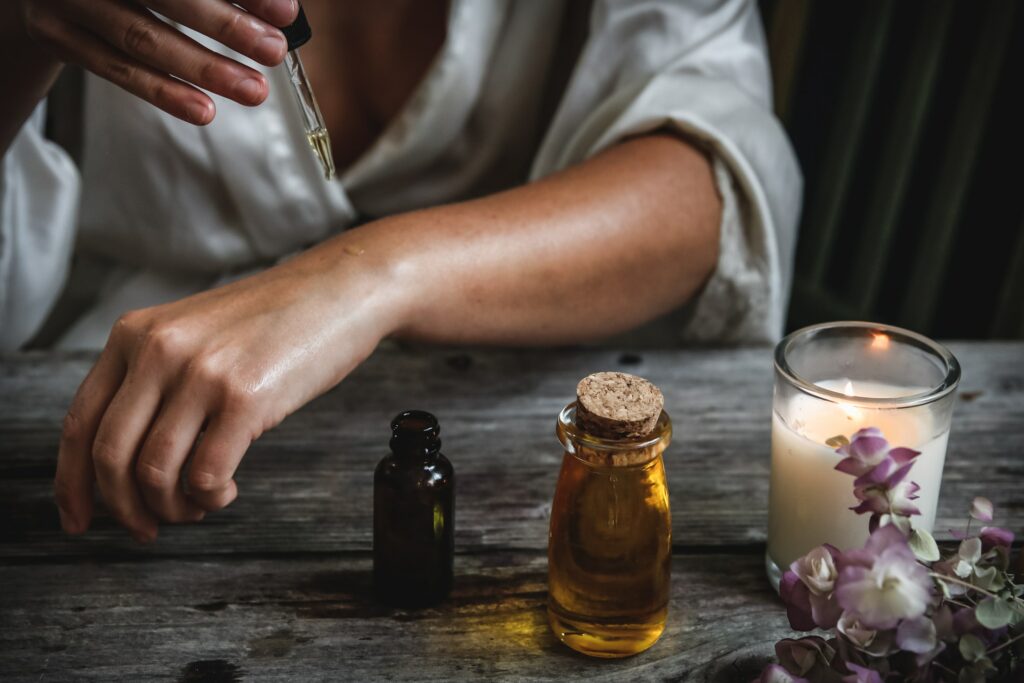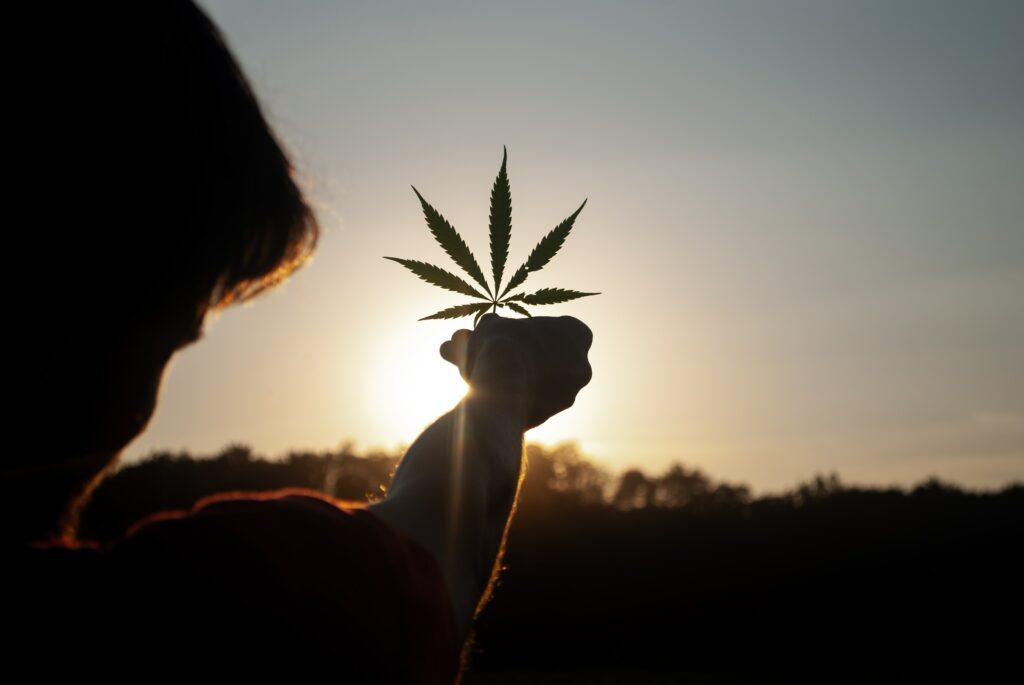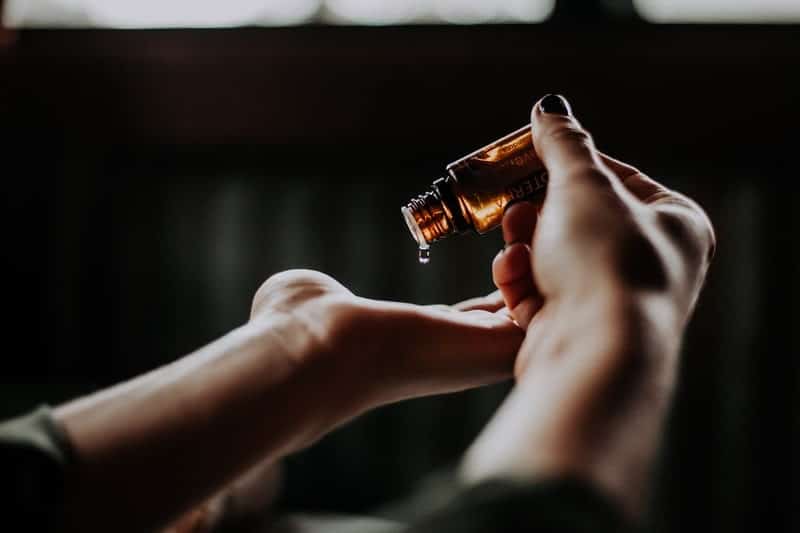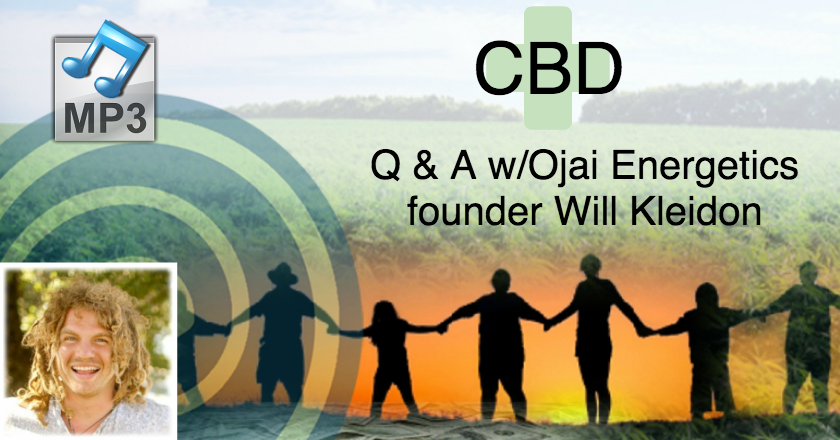Learn about CBD with Will Kleidon
Listen to the Interview Below
Transcript of Interview
What’s your background and how has that led you into the CBD movement?
Sure. I’ve always been passionate about health and plants. One of my earliest memories was actually on the playground in preschool; a friend fell off the monkey bars, and this plant- it felt like it whispered intuitively- communicated with me to rub it on his arm, and I grabbed it and put it on his arm. He stopped crying, and the redness went down, and that kind of sparked a passion.
I studied holistic health and sustainable community development for college, and had heard about CBD for its benefits and common properties when it first started getting more buzz about four of five years ago. With googling it, I was surprised to see that you could buy it online on Amazon, and so I looked into it, asked some attorney friends to see how that was legal, and after that, they told me if it’s done from hemp, it’s legal in all fifty states, as long as it’s from the stock and stem of cannabis hemp grown outside of the US. That was a legislative, bureaucratic thing.
So I got excited about it and started looking into it. I had no idea how important and profound of a compound it really was, and when I looked at the products I could get online, none of them were formulated in a way that I would want to put in my body. They had genetically modified corn glycerins and preservatives, and I decided to launch and formulate a product that I would want to take, and the universe provided me with synchronicity after synchronicity; finding amazing experts and chemists, and a team, and it’s led to here.
It’s been an incredible journey that’s constantly expanding my awareness of what a profound plant hemp is, and how it works with us now that we’ve evolved with it. I was inspired to see something produced that wasn’t filled with stuff that caused damaged when taking something that was so rich with health benefits. So I set out to formulate something that was totally gluten-free, preservative-free, corn-free, soy-free, and infused with super foods, to create a synergy effect for the benefit, and that’s what we’ve done.

What are some of the benefits of CBD?
It really has deepened my relationship with the plant and the compound. I believe that it is one of the most important nutrients we can take as modern humans, and that’s a pretty bold statement, yet the science backs it up.
Every single vertebrate, and some invertebrates, like snails, which are fascinating, have endocannabinoid systems, and that is a series of receptor sites in our bodies. That system’s function is related to all of the other systems of the body, so the skeletal system, the muscle system, the reproductive system, the digestive system, respiratory, elimination, the brain, nervous system; literally every system is connected to the endocannabinoid system, and the endocannabinoid system’s function is to regulate our body’s homeostasis.
Homeostasis means all of the bits and parts working together in synergy, so that they benefit each other as a greater whole, and in balance. Its function is to make sure everything is operating at optimal levels and communicating together, so that we function and thrive as a whole.
The endocannabinoid is pretty much the master system/control system of the body we’re finding. It was discovered in 1996, so we’re at the cutting edge of really discovering the most important system of the body, and there’s a lot more research to be done, but what it’s shown, is that our bodies produce natural cannabinoids, and we know two of them. One is called anandamide, which is an endocannabinoid; ‘endo’ meaning produced inside the body. It’s named after the Sanskrit word ‘ananda’, which means bliss, and that’s one of the primary cannabinoids we produce naturally. The other is called 2-AG. They work on multiple receptor sites of the endocannabinoid system.
Then there’s exocannabinoids, which are produced outside the body, where highest concentrations are found in the cannabis plant. That includes CBD and THC, which has been more famous. CBD is non-psychoactive, unlike THC, so what it does is, it naturally lowers an enzyme in the body that destroys the anandamide, and by doing that, its boosts our body’s natural anandamide levels. More than that, on that level, it’s super critical for us as modern humans, because there was an exponential growth of information and stress as a modern human that happened in one generation.
We’re exposed to way more chemicals than ever through petrochemicals, and also sensory input. It happened over sixty years, so our bodies never adapted and evolved to be able to have an endocannabinoid system to match the input of modern living. So it’s vital to take CBD, and that takes the endocannabinoid system and really boosts it into drive, and brings it back online to optimal levels. Because the endocannabinoid system’s role is to balance and make sure everything’s running properly, every single system of the body then benefits. It’s critical, as a modern human, to take it as a nutrient. Just like we need vitamin c, we need CBD in order to be living and driving the way that we’re designed to.
It benefits every single system of the body, and it’s really profound how it impacts people’s lives.
So modern living is throwing off our endocannabinoid system?
Yeah. It basically requires the endocannabinoid system to work on overload, and so, just like when you’re working hours and you’re tired, you’re not going to be performing as well as if you’ve got sleep and you’ve eaten a good nutritious meal. With modern living, our bodies didn’t adapt to produce enough cannabinoids internally to stay on track with the modern world. When you supplement, it’s like putting extra fuel in the tank, and getting it into drive as opposed to idling. So people, when they take it, they go, ‘Wow! I feel better than I’ve ever felt. I feel like a kid again, I’m calm, I’m focused, I can perform better athletically and mentally’, and that’s how we’re designed to feel. We just didn’t adapt in time, because of quickly technology expanded and the industry expanded. So it regulates all the systems of the body, it balances blood sugar levels, it makes sure the muscles are functioning optimally, it’s clinically shown to increase bone density, it’s also clinically proved to increase neurogenesis in multiple regions of the brain, and so when you supplement with CBD, it literally gives you news brain cells, which is really profound.
How is CBD unique?
There’s particular terpenes that can help promote neurogenesis; CBD is the superstar in really creating regenerative brain growth in the hippocampus and the olfactory bulb, and multiple regions of the brain. Around twenty-five, neurogenesis really slows down, and with the intake of CBD- which is a compound we’ve evolved with; there’s evidence and theories that cannabis was the first domesticated plant. So all our ancestors, and a majority of the people on the planet, have been intaking and eating and consuming CBD for millennia. It really keeps the brain regenerating after it starts to slow down at twenty-five.
Can you only get CBD from Cannabis Sativa?
It’s in cannabis indica and ruderalis, so there’s three distinct varieties. The definition of hemp is ‘any cannabis plant that produces 0.3 THC and less’, and there are CBD-like compounds, slightly different, found in flax and purple echinacea, which work on the cannabinoid system, but they’re not normal cannabinoids. The primary producer of CBD and cannabinoids is the cannabis plant, and also hops. Hops is the closest cousin to cannabis, and there is CBD in hop leaves; not anywhere near the concentration of the cannabis plant, but that is the only other plant I know of that actually has CBD produced in it. So IPAs made with hop leaf extract have CBD in them.

Where is the CBD Concentrated in Cannabis?
The height of concentration is in the flowers, but there’s a good concentration in the stalks and the stems. Unfortunately, due to the controlled substances act, currently, it excludes the flowers from the definition of hemp. But the new farm bill that was in 2014, has redefined hemp as the entire plant as long as it produces below 0.3 THC. That’s for research purposes, and not for interstate commerce yet, but that is going to convert soon, so we will then switch to flowers. But the body doesn’t care where it comes from. As long as you’ve got the terpenes and a full host of other cannabinoids with the CBD, the body doesn’t care if you’ve got it from the flower or the stalk or the stem.
There’s a lot of misinformation saying the CBD from hemp is inferior to the medical cannabis. There’s different ratios of CBD to THC from the medical cannabis, but for the strains that are the non-psychoactive medical cannabis strains, like Charlotte’s Web or ACDC, those are legally hemp. What we use is a pure cannabis sativa hemp grown in Europe, and we do a CO2 extract from the stalk and stems.
What else is CO2 used for?
Yeah. So for hops, tulsi, and a lot of herbs, the solvent CO2 is very benign. It’s non-toxic, and it’s a very pure and effective way to extract cannabinoids and other compounds from different plants. There are people who do solvent extracts, which I’m not a fan of, just because of the toxicity of the solvents used. People can do it in a way where, if it’s purged properly, you would not have a residue, but there always runs the risk of higher concentrations of solvents, and it’s dependent on toxic compounds to get it, which I’m not a fan of. We’re all about protecting the environment, as well as the people who are part of the process.
What about other cannabinoids than CBD?
Yes. Great question. We’ve identified over four hundred unique cannabinoids, probably more, and we really only know THC as being the most tested. CBD is up there, and for about ten more are getting more and more research done on them. One CBC, another is CBN, there’s CBG, there’s CBDA, THCA, and THCV, and THCV-A, I believe. With our CO2 extract, there’s a full spectrum, so it’s getting every cannabinoid. We test for CBC, CBG, THC, CBDA, THCA and CBN using third party testing per batch for those, and it’s critical to have all of the cannabinoids.
I’m a strong believer in keeping the plant in its holistic form when you begin to isolate and pull out CBD by itself, or other cannabinoids by themselves. There’s a lot of evidence showing that it doesn’t help the body nearly as much, and it’s much less bioavailable, so there are companies doing pure ninety-nine percent CBD crystals, and they are void of terpenoids and other cannabinoids, and there’s a lot evidence that it does not work anywhere near as well as a full spectrum extract. So it’s critical to have a little bit of THC, because helps the uptake and the synergy of the plant. The known psychoactive threshold is one percent or great of THC.
The standard for hemp is below 0.3, so it’s well below a psychoactive level, and we ensure that all of our products are below 0.3 so they are legal for consumption everywhere in the US as well as forty-three other countries.
What’s a common dosage for CBD?
It really depends on what people are wanting to get out of it. Because of the state of modern living where most people have not been intaking the cannabinoids, our internal system has been overloaded and trying to get as much as it can get. It’s created an excess number of sites to try and pick up as much cannabinoids in the body as it can, so when you start taking CBD, you need to ‘prime the pump’ so to speak, and take about a double dosage initially, to get the endocannabinoid system primed. At that point, it’s saying, ‘Oh, I’m getting enough cannabinoids, I can now regulate’, and then after about a week to three weeks, people can cut the dosage in half.
So I recommend, as a starting dose, about two dropper-fulls, and then going down to one for overall optimization of their body’s functions, health benefits, staying calm, sleeping really well, having optimal muscle function, and overall thriving. Then, people can take more if they are wanting to in particular cases. I don’t recommend exceeding eight dropper-fulls a day unless directed by a practitioner. In terms of safety, the CBD in the cannabinoids are some of the most benign compounds on the planet. The LD50, which stands for ‘lethal dose fifty percent’, meaning half of a lethal dose, is so significantly well beyond the LD50 of water. You would die of drowning before you would get any damage or harm from CBD intake. It’s exceptionally safe.
I always recommend that if you’re starting a new intake of a nutrient, if you’re working with a practitioner, to talk to them about it, and there’s some evidence showing that it does lower an enzyme called P450, which is a series of enzymes that the liver uses to metabolize compounds. There’s also other evidence showing that it increases it, which kind of fits in the model of how CBD works; that it’s an adaptogen. It can move depending on what the person needs to produce more or less of something, like increase immune cells and decrease immune cells, depending on what that person needs to stay in optimal balance. More with the P450; it demands that people, if they’re taking medications and it says on their label ‘do not take with grapefruit’, CBD is a little bit stronger than grapefruit, so people do need to be careful if that’s on the label, and work with their practitioner.
With the P450 enzyme, what that would mean is that the pharmaceutical that they’re taking would stay active in the blood. So they would never…, and get a little bit stronger eventually. That’s the only contrary indication out there for it, which means it’s great for pretty much everyone.

What is the future of CBD?
I think it’s going to be just as important as people knowing they need to have vitamin C; people will be taking CBD. It’s going to be one of the biggest spaces, because it really does benefit every single person, and it’s such a vital compound to live optimally as modern humans. It’s going to be household knowledge in the coming years of ‘have you had your CBD today?’, and it’s really exciting that we get to be part of the forefront of this movement that’s transforming hundreds of thousands of people’s lives, with incredible results of people saying that their life has changed permanently for the better.
It’s a real privilege to be part of that, and be innovating the space like we’ve done with our water solubility, which vastly improved bioavailability, which means how much is available to get into the blood, and is actually usable by the body. We’ve got a patented process that only uses certified organic ingredients, and it basically encapsulates the oil in tiny little bubbles of water, so when you take it in, it instantly absorbs into the blood. Regular CBD oil takes about thirty minutes before it can get into the body and be used, and by that time, around ninety percent of what you’ve taken has been destroyed. So if you eat ten milligrams of a regular CBD oil, only one makes it into the body to be used, whereas with ours, one milligram of ours is about the equivalent of eating ten.
So it’s significantly more bioavailable. Our two hundred and fifty is the equivalent of twenty-five hundred milligrams of a regular CBD, and so that’s been awesome to release so people can get much more affordable access to it. It’s also fast reacting. So I see it becoming common usage, and I think it’s a human right to be able to have a healthy endocannabinoid system that is optimized. we’re just at the forefront of understanding what it does, and we already know that it optimizes the function of your heart, of your brain, of your eyes, of your bones and your muscles, your digestion, and I see it as a critical piece of humanity’s evolution to come forth and come together and optimize our health.
I believe that that change takes place inside oneself first, and as it naturally engages the parasympathetic nervous system, what that means is that it gets people out of their reptilian brain and into their more conscious, calm brain, and enables people to be relaxed and informed as opposed to reactive. I see it being a catalyst of humanity making more calm and interconnected choices as opposed to reactions, which I believe has led us to see quite a bit of suffering.
It’s inspiring that CBD can aid in the next step to a healthier more peaceful planet, in a very rounded and practical manner.





